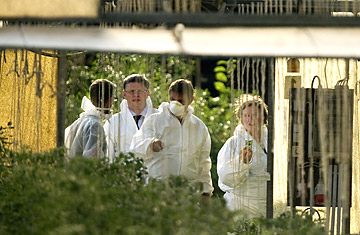
Members of the Robert Koch Institute investigate an organic farm that was identified as a possible source of the E. coli outbreak in Bienenbuettel, Germany, on June 6, 2011
(2 of 2)
Perhaps as a result, the blame-Spain and bean-sprout stories emerged and spread. Says John Dalli, European Commissioner for Health and Consumer Policy: "It is crucial that national authorities do not rush to give information on source of infection which is not proven by any bacteriological analysis, as this spreads unjustified fears in the population all over Europe and creates problems for our food producers in selling products in the E.U. and outside." Adds Pesonen, the European farmers' union chief: "Information flow needs to be secured between local and regional, national and E.U. authorities."
The economic cost is significant for Germany too. The German Farmers' Association has estimated that vegetable farmers are losing around €30 million ($44 million) a week in sales. Restaurants, suppliers and markets have also been hit hard. But there are wider ramifications. Two countries have banned all E.U. farm products altogether: Lebanon and, all the more significantly, Russia. E.U. countries export between €3 billion and €4 billion ($4.3 billion and $5.8 billion) fresh fruit and vegetables to Russia per year, primarily in apples, making it by far the largest export market for European growers. That includes 11% of its tomatoes and 5% of cucumbers. The Europeans believe that Moscow is being malicious, trying to gain the upper hand as it maneuvers toward joining the World Trade Organization (talks are set to begin on June 9). Russian Prime Minister Vladimir Putin said the ban may go against "the spirit of the World Trade Organization ... but cucumbers that people die after eating really stink." Paola Testori Coggi, head of the European Commission's health directorate, called the ban "disproportionate, scientifically unjustified and as such not in line with the principles set by agreements."
"It's a Russian habit. They love to slap bans on our exports, and it fits in with their 'us against them' mentality," said one E.U. official. Indeed, in January, the Russian state consumer rights watchdog urged consumers to avoid German food imports because of possible dioxin contamination and to purchase local products instead (even though the Commission said the levels of dioxin in contaminated eggs and meat posed no health risk). In 2005, Moscow imposed a ban on Polish meat and other farm products, saying the quality of Polish food products was low and did not meet hygienic standards, although Polish and E.U. officials vehemently rejected the claims.
All this turmoil — 2,300 infections, 22 deaths as well as economic chaos — all because of a bacterium that wiggled into the food-supply chain. Says Wenonah Hauter, executive director of Food & Water Watch, an environmental NGO based in Washington: "A lot of time can pass between someone eating a food that makes them sick and an outbreak investigation figuring out the source, because there are so many steps in the process. By the time people get sick — which can take days or even a week after eating the food — and go to the hospital, it gets reported into the system and they get interviewed about what they ate, a good bit of time has passed. All the while, the food may have been distributed further and eaten by more people."
When the investigation reaches its conclusion, the existing system may come in for a fresh overhaul — with potentially expensive results. Says Pesonen: "All too often, problems in one part of the food chain may lead to a collapse of the whole food chain. This is becoming increasingly difficult to manage due to more efficient production processes. Margins of maneuver are limited, no buffer stocks exist and everything should be delivered just in time. In many cases, the production process takes months or even years. If we have a withdrawal of one part of the chain, it would be very difficult or even impossible to recover in other parts of the chain." Sometimes, all it takes is a little bug to undo even the best of systems.
— With reporting by Tristana Moore / Berlin
